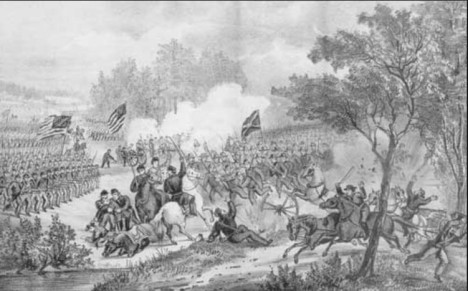Little Doctor on the Black Horse
Prisoner of War
by Harriott Benedict Wickham Barton
.
In September 1863, Rosecrans’ (the soldiers called him “Old Rosie”) army was maneuvering here and there through northwest Georgia. Rumors were about that a big battle was impending. David prudently sent home the pistol his grandfather Platt B. had given him for “if a surgeon is captured with a gun, he is a combatant; if no gun, he can expect better treatment.”

The Battle of Chickamauga
On Sept, Rosecrans had taken Chattanooga and pursued Bragg’s army into north Georgia, where, on Sept. 19-20, at Chickamauga, he was defeated and forced back into Tennessee. And a Chickamauga David’s premonition proved true. Here is his next letter (an account of the battle given at end): *
.
Chickamauga Valley, Ga., 9/28/63
“My dear wife, I am here held as a prisoner of war. I am well and so far have been treated as a gentleman. I have taken a parole to stay with our wounded, and when they have been disposed of, to report to Atlanta for imprisonment. This may be the last you will hear from me for some time, as we are to be held as prisoners of war until some Confederate surgeons are released; so say the Confederate officers. Take good care of the children and remember your absent though affectionate husband, D.D. Benedict.”
.
We can imagine poor Hattie’s dismay! It was almost a month until his next letter, and it could not have been a very comforting one.
#
* Because David Benedict does not mention the Battle of Chickamauga in his letters, Harriott Benedict did not describe it in Little Doctor on the Black Horse. At the end of the memoir she included an account of the battle and its aftermath based on the book Captive of War by Hospital Steward Solon Hyde, who describes not only his experiences, but also Doctor Benedict’s actions during and after the battle. I will publish her account of the battle in “Muskets and Medicine” and “Nathan Bedford Forrest Comes to Breakfast” before returning to Little Doctor on the Black Horse with post #5 titled “Libby Prison.”
Next Post: Libby Prison
 About the Author: Harriott Benedict Wickham Barton (1890-1981) was born in Norwalk, Ohio to Frank and Agnes Wickham. Her father was the youngest of twelve children of Frederick and Lucy Wickham, early settlers of the Firelands, and her mother was the great-great granddaughter of Platt and Sarah Benedict, who founded the city of Norwalk. Educated at Norwalk High School and Wooster College, she became a teacher. She marched as a suffragette and worked for the Labor Department during World War I. After the war, she went west to teach school, and became one of the last homesteaders, proving up a property near Wheatland, Wyoming. She married Angus Barton in 1924 and they raised four children on the homestead through the Dust Bowl and World War II. In the late 1940s, she and her Angus moved to Ohio, where they spent the rest of their lives. During the 1950s and ‘60s, she wrote “Little Doctor on the Black Horse,” poetry, and short stories, some which were published in various journals and magazines.
About the Author: Harriott Benedict Wickham Barton (1890-1981) was born in Norwalk, Ohio to Frank and Agnes Wickham. Her father was the youngest of twelve children of Frederick and Lucy Wickham, early settlers of the Firelands, and her mother was the great-great granddaughter of Platt and Sarah Benedict, who founded the city of Norwalk. Educated at Norwalk High School and Wooster College, she became a teacher. She marched as a suffragette and worked for the Labor Department during World War I. After the war, she went west to teach school, and became one of the last homesteaders, proving up a property near Wheatland, Wyoming. She married Angus Barton in 1924 and they raised four children on the homestead through the Dust Bowl and World War II. In the late 1940s, she and her Angus moved to Ohio, where they spent the rest of their lives. During the 1950s and ‘60s, she wrote “Little Doctor on the Black Horse,” poetry, and short stories, some which were published in various journals and magazines.
Thanks for visiting! Share and like this post below, and on Facebook. Let me know what you think in the comments. I’d love to hear from you!
© 1961 by Harriott Benedict Wickham Barton. All rights reserved.
Filed under: Civil War | Tagged: Battle of Chickamauga, Civil War, David DeForest Benedict, Rosecrans |


Leave a comment